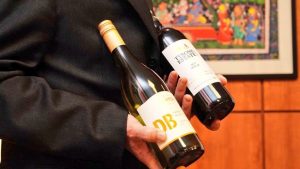In 2003, members of U.S. Congress dined on “freedom fries” after France declined to support an invasion of Iraq. In 2020, in response to Beijing’s move to raise taxes on Australian products, Taiwan’s Foreign Ministry is showing its support by drinking “freedom wine.”
The Inter-Parliamentary Alliance on China (IPAC), a group of over 200 parliamentarians from 19 countries, launched a campaign on Tuesday to purchase Australian wines in support of the country as tensions between Canberra and Beijing continue to flare. Taiwanese diplomats eagerly joined in – because what’s better than a drink for a good cause?
“We stand in solidarity with #Australia by serving #FreedomWine at @MOFA_Taiwan,” the country’s Ministry of Foreign Affairs (MOFA) tweeted on December 1 along with a photo of a person holding two bottles of Australian wine and the hashtag #StrongerTogether.
Hsiao Bi-khim, Taiwan’s representative to the United States, retweeted IPAC’s campaign announcement and said “Thinking of stocking up on Australian wine.”
President Tsai Ing-wen said Wednesday Taiwan would back Australia as they are “under tremendous pressure” from Beijing, touting the strength of ties between the two countries and hinting at further action from Taiwan to support Australians.
Beijing’s recent round of sanctions on Australian goods has especially throttled the country’s wine industry. Around 40 percent of Australian wine exports by value head to China, but they’ve now been hit by taxes of between 107.1 and 212.1 percent. The Chinese Ministry of Commerce said Thursday these duties could be extended for up to nine months.
The taxes were imposed following a formal complaint over cheap imports by the China Alcoholic Drink Association in July. They have led Australian winemakers to call for a quick pivot to other markets, with the head of the country’s top wine organization saying the taxes have left wine producers in “a world of pain.”
But the new sanctions are also part of a larger dispute between Beijing and Canberra. On Monday, Chinese Ministry of Foreign Affairs spokesman Zhao Lijian posted a doctored photograph on Twitter showing a smiling Australian soldier holding a bloody knife to the throat of an Afghan child and wrote: “Shocked by murder of Afghan civilians & prisoners by Australian soldiers.” Beijing rejected Australian demands for Zhao to remove the post and apologize.
The tensions have provided Taiwan an opportunity to tout itself as a more palatable alternative to its cross-strait neighbor.
Taiwan is Australia’s ninth largest customer for exports, and the two parties have strong economic links, which the Tsai administration has attempted to reinforce. Tsai’s New Southbound Policy, her signature campaign of deepening economic ties with South and Southeast Asian neighbors, includes and prioritizes relations with Canberra.
While a potential bilateral trade agreement between Taiwan and the United States gobbles up most of the headlines, Taiwanese diplomats have frequently hinted at their desire for a formal trade agreement with Australia. Tsai has openly expressed her hopes for such a pact several times in the past few months.
Recently, as Beijing-Canberra tensions have risen, more Australian officials have begun to call for a trade agreement. Queensland Liberal MP Ted O’Brien said in September Australia should pursue a free trade agreement with Taiwan and support Taiwan’s entry into the Trans-Pacific Partnership. Former Australian Prime Minister Malcolm Turnbull lent his support to a Taiwan-Australia trade agreement in October.
Australia tabled trade negotiations with Taiwan in 2016 over fears they would anger Beijing. But Prime Minister Scott Morrison’s government has been willing to offer vocal support to Taiwan and joined a group of nations calling for its inclusion in the World Health Assembly as an observer in May.
O’Brien insisted other countries had negotiated trade agreements with Taiwan without facing negative consequences from Beijing, telling The Australian Financial Review in September trade with Taipei would fall in line with the government’s desire for trade liberalization.
“Singapore and New Zealand have struck FTAs with Taiwan without breaching its diplomatic recognition of the People’s Republic of China, and I see no reason why we couldn’t do the same,” O’Brien said, noting that New Zealand’s trade pact with Taiwan led to a 22 percent rise in exports.
Australia’s wine industry received support from the U.S. National Security Council, as well, which said Australian wine would be featured this week at a White House holiday reception. “Pity vino lovers in China who, due to Beijing’s coercive tariffs on Aussie vintners, will miss out,” the council tweeted.
Taiwan may not yet have a free trade agreement with Australia, but in the meantime, its politicians will be more than happy to usher in the island’s cooler winter months with a bottle of freedom wine.

































